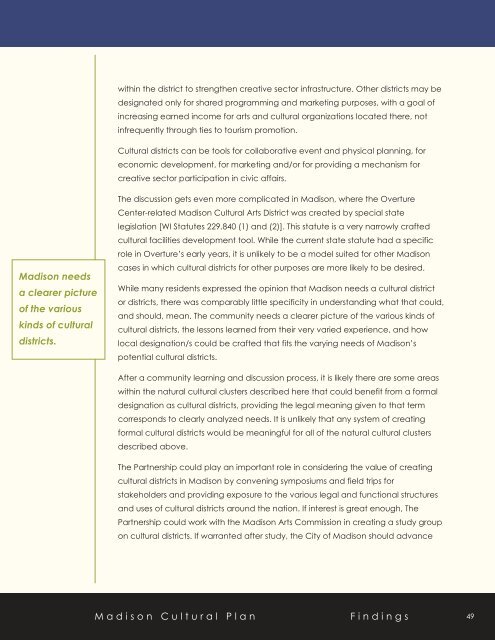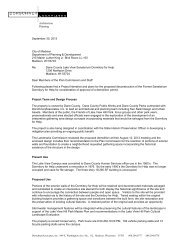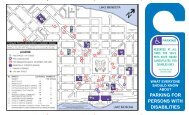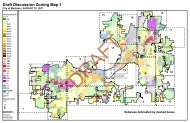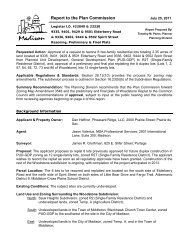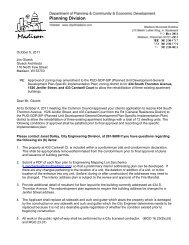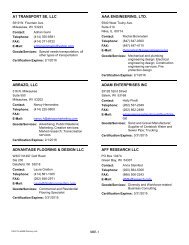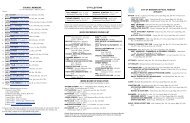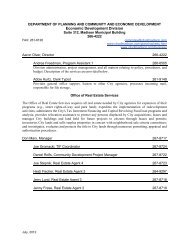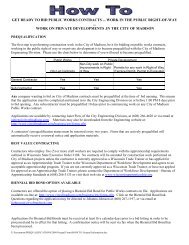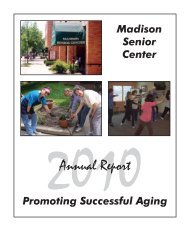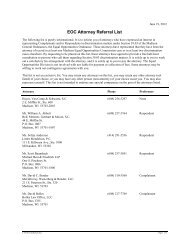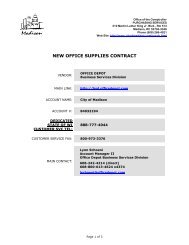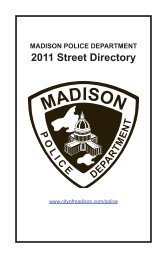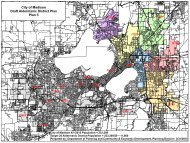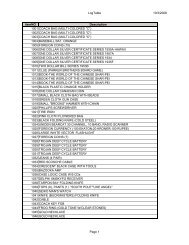Madison Cultural Plan 2011 - City of Madison, Wisconsin
Madison Cultural Plan 2011 - City of Madison, Wisconsin
Madison Cultural Plan 2011 - City of Madison, Wisconsin
Create successful ePaper yourself
Turn your PDF publications into a flip-book with our unique Google optimized e-Paper software.
<strong>Madison</strong> needs<br />
a clearer picture<br />
<strong>of</strong> the various<br />
kinds <strong>of</strong> cultural<br />
districts.<br />
within the district to strengthen creative sector infrastructure. Other districts may be<br />
designated only for shared programming and marketing purposes, with a goal <strong>of</strong><br />
increasing earned income for arts and cultural organizations located there, not<br />
infrequently through ties to tourism promotion.<br />
<strong>Cultural</strong> districts can be tools for collaborative event and physical planning, for<br />
economic development, for marketing and/or for providing a mechanism for<br />
creative sector participation in civic affairs.<br />
The discussion gets even more complicated in <strong>Madison</strong>, where the Overture<br />
Center-related <strong>Madison</strong> <strong>Cultural</strong> Arts District was created by special state<br />
legislation [WI Statutes 229.840 (1) and (2)]. This statute is a very narrowly crafted<br />
cultural facilities development tool. While the current state statute had a specific<br />
role in Overture’s early years, it is unlikely to be a model suited for other <strong>Madison</strong><br />
cases in which cultural districts for other purposes are more likely to be desired.<br />
While many residents expressed the opinion that <strong>Madison</strong> needs a cultural district<br />
or districts, there was comparably little specificity in understanding what that could,<br />
and should, mean. The community needs a clearer picture <strong>of</strong> the various kinds <strong>of</strong><br />
cultural districts, the lessons learned from their very varied experience, and how<br />
local designation/s could be crafted that fits the varying needs <strong>of</strong> <strong>Madison</strong>’s<br />
potential cultural districts.<br />
After a community learning and discussion process, it is likely there are some areas<br />
within the natural cultural clusters described here that could benefit from a formal<br />
designation as cultural districts, providing the legal meaning given to that term<br />
corresponds to clearly analyzed needs. It is unlikely that any system <strong>of</strong> creating<br />
formal cultural districts would be meaningful for all <strong>of</strong> the natural cultural clusters<br />
described above.<br />
The Partnership could play an important role in considering the value <strong>of</strong> creating<br />
cultural districts in <strong>Madison</strong> by convening symposiums and field trips for<br />
stakeholders and providing exposure to the various legal and functional structures<br />
and uses <strong>of</strong> cultural districts around the nation. If interest is great enough, The<br />
Partnership could work with the <strong>Madison</strong> Arts Commission in creating a study group<br />
on cultural districts. If warranted after study, the <strong>City</strong> <strong>of</strong> <strong>Madison</strong> should advance<br />
<strong>Madison</strong> <strong>Cultural</strong> <strong>Plan</strong> Findings<br />
49


